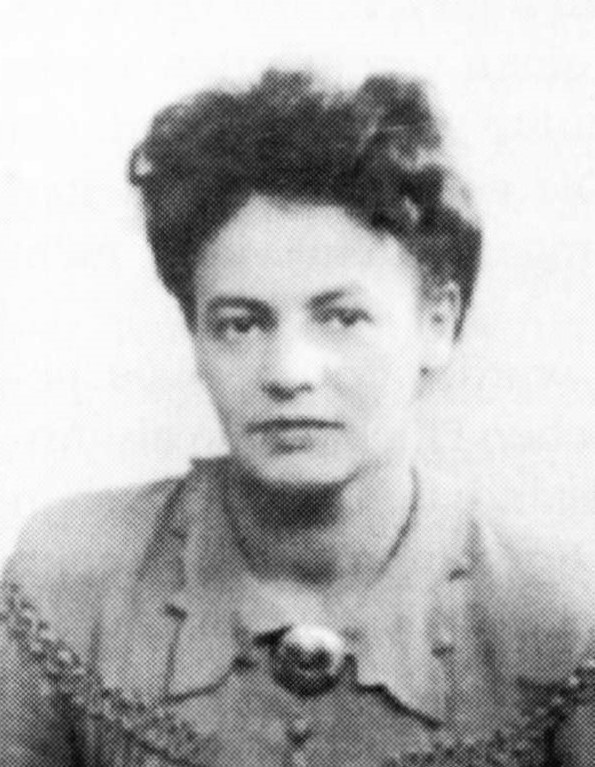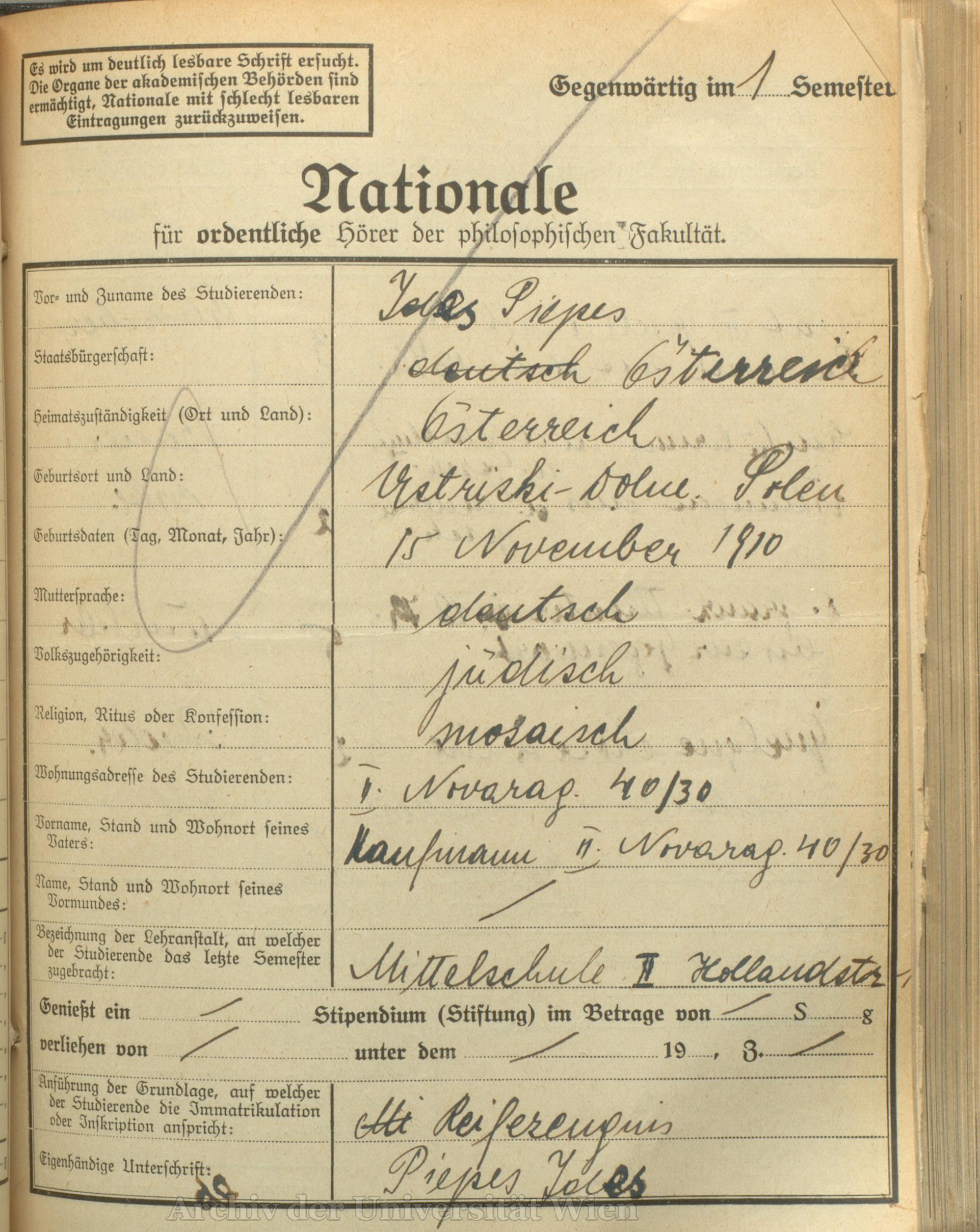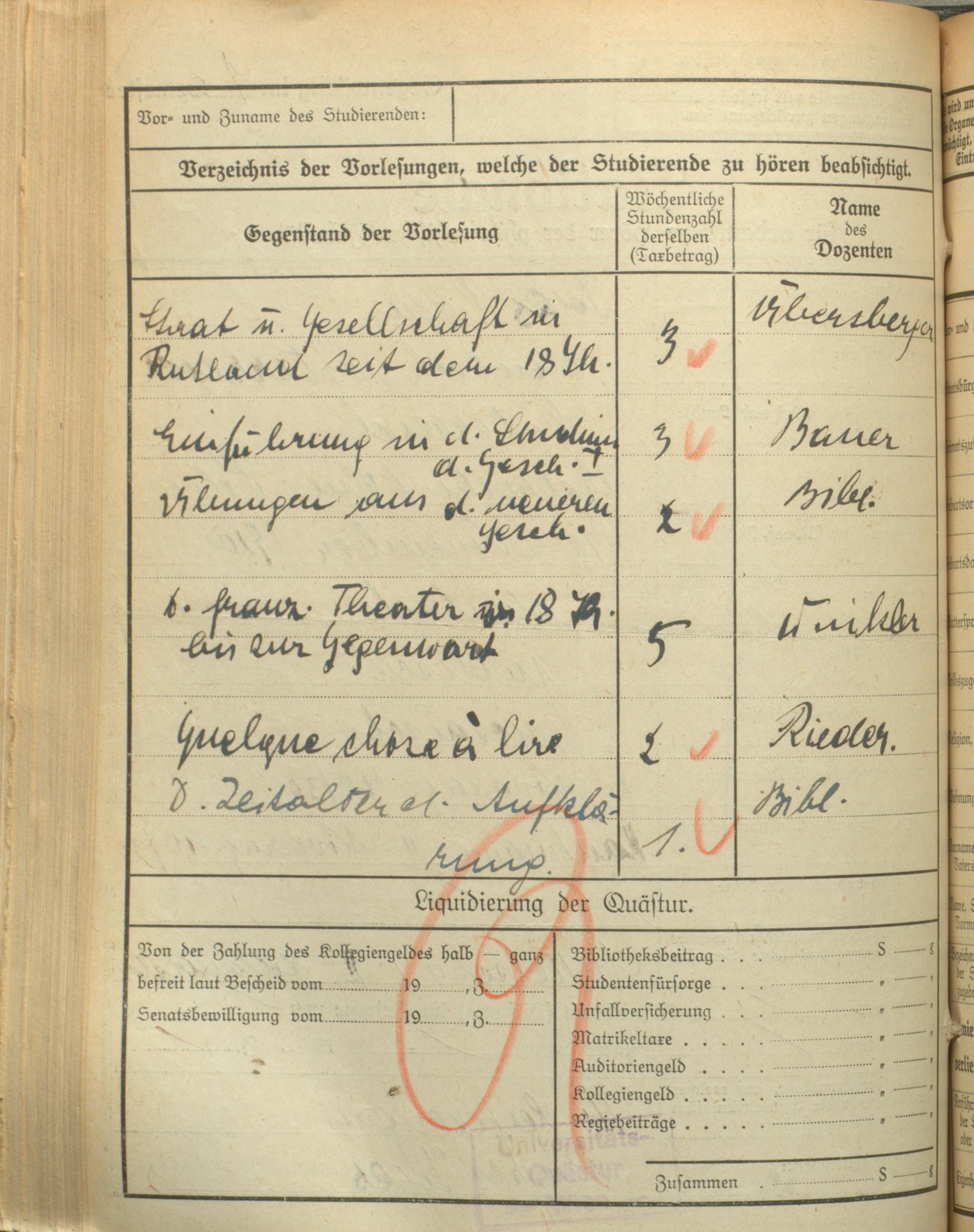
| Born: | 11-15-1910 |
| Faculty: | Philosophical School |
| Category: | Expelled student |
Ida MARGULIES, née Ides (Ida) PIEPES, recte PIEPA, born on November 15th, 1910 in Ustrzyki dolne, Galicia/Austria-Hungarian empire [Poland] (entitled residency Vienna, citizenship 1938: Austria), daughter of Josef Piepes (merchant in Vienna), lived in Vienna's district 2nd, Novaragasse 40/30. She was the sixth of seven children of an impoverished but very well-educated Jewish family, which had to emigrate from Galicia in Ida's early childhood and came to Vienna, where the girl completed her schooling and had to contribute to the family income by working at home. Early on, she became involved in the left-wing socialist Jewish youth organization Haschomer Hazair, where she also met her partner Moritz Margulies (1910–1964); both joined the Communist Party of Austria (KPÖ) while still in high school in 1930.
On June 18th, 1930, she passed her school-leaving examination (Matura) at the Mädchenrealgymnasium Wien II (Vienna's 2nd district, Novaragasse 30) and began to study history and Romance languages and literature at the University of Vienna in the fall term of 1930/31 (her boyfriend started studying medicine in 1932). She was last enrolled at the Philosophical School in the fall term of 1933/34 and was then in the examination stage.
Ida Piepes was arrested under Austrofascism after the suppression of the civil war in February 1934, but was released after a few days, as was her friend Moritz Margulies, who, however, was arrested again in 1935 for political reasons and then remained imprisoned for almost a year. Ida obtained a release for him, ostensibly to marry him: they used this opportunity to escape to Czechoslovakia. The KPÖ, which had been banned in the meantime, soon sent Moritz to Switzerland to organize illegal border crossings of Spanish fighters. Ida visited him there often, but for the time being continued to work on her degree in Vienna.
She had submitted her dissertation "Die politisch-humoristischen Witzblätter von 1848 bis 1860" (The Political-Humoristic Journals from 1848 to 1860) in Vienna on March 19th, 1936, and had registered for the final examinations/viva voce ("Rigorosum") in modern history with geography as a minor subject. Her one-hour viva (Philosophicum) was scheduled for June 27th, 1936; the philosopher Prof. Moritz Schlick (1882–1936) and the psychologist Prof. Karl Bühler (1879–1963) were designated as examiners. However, Moritz Schlick was shot on the stairs of the University of Vienna the week before the scheduled examination - the result of the poisoned social and academic climate under Austrofascism and at the university of the time. Ida's examination nevertheless took place on the scheduled date - the philosopher Robert Reininger (1869–1955) examined in place of Moritz Schlick.
Her dissertation, which was written at the suggestion of the historian and newspaper scholar Prof. Wilhelm Bauer (1877–1953), was approved by the latter and the second examiner Prof. Alphons Dopsch (1868–1963) on April 11th, 1936, but Bauer criticized in his report the overly democratic attitude in her assessment of the importance of freedom of the press in times of state oppression around the revolutionary year 1848, stating:
"The presentation is not to be denied diligence and skill, but it very often lacks the objectivity necessary for the historian. With the one-sidedness of a liberal worldview, every restriction of journalism is condemned, every opinion in favor of the government is labeled 'reactionary' from the outset. By these generalizing considerations, the candidate deprives herself of effect when she makes a justified judgment in individual cases." (Archives of the University of Vienna, Rigorosenakt PHIL 13000)
In the run-up to the murder of his colleague Moritz Schlick, which was partially welcomed by the media, because of his "liberalist world view", this was a daring criticism. However, the examination procedure was not continued until several months later, after she had been exempted from the obligatory examination in Ancient Greek, on January 13th, 1937, with the two-hour subject rigorosum with the two dissertation examiners Bauer and Dopsch as well as the geographer Prof. Hugo Hassinger (1877–1952) – Ida Piepes passed with good success. Thus all requirements for the doctorate would have been fulfilled, but the ceremonial conferral including the doctoral oath did not take place until after the end of Austrofascism and National Socialism in 1946. (Two of her siblings studied partly simultaneously with her: Her older sister Rachel Piepes, born in 1909, studied German language and literature from 1929 to 1934 and was able to complete her studies in July 1938, at least within the framework of a "non-Aryan doctorate" - however, this was simultaneously connected with a professional ban in the entire sphere of influence of the German Reich; her younger brother Simche Wolf Pipes [sic!], born in 1913, studied philosophy from 1931 to 1935 and was able to obtain a doctorate in 1937).
Ida Piepes joined Moritz Margulies in Basel/Switzerland before receiving her doctorate and, like him, became politically active despite a ban. When the Swiss police found her alone during a house search and could not find any evidence of political activity, she was nevertheless arrested because she was living together with a man unmarried - a criminal offense in Switzerland at that time. After her prison sentence for "concubinage" expired, she had to leave Switzerland, but was quickly able to re-enter illegally. Soon after, Moritz Margulies worked in a refugee camp in Brussels, Belgium, where Ida Margulies followed him and where their son Jean Margulies (1939–2015) was born (they had married shortly before). After the invasion of Belgium and northern France by the German Wehrmacht in May 1940, the young family had to flee to southern France. After stays in refugee camps in Toulouse, St. Cyprien and Marseille - an attempt to obtain an entry permit to the Soviet Union failed – both continued to be active in the resistance. Their son, now three years old, was placed until the end of the war with Henriette and Henri Marius Julien, who ran a home for the children of Jews, political prisoners, and members of the Résistance and brought them across the border to the safety of Switzerland.
With forged papers, Ida Margulies found work in Nancy, France, in the kitchen or office of the Renault factory, but was recognized there by a Wehrmacht helper, a former schoolmate, and had to flee to Paris. In Paris, she received new papers with a new identity and worked as a secretary in the Navy Ministry under the name "Lucienne Raynod." Here she smuggled leaflets into the ministry, made carbon copies of important documents for the Résistance, and organized blank identity cards. When a resistance fighter was arrested with such a fake ID, the Gestapo unmasked Ida Margulies. After severe torture and imprisonment, she was sentenced to death and taken to the collection camp in Drancy near Paris, to be deported to a concentration camp. After the timely liberation of the camp by the Allies in 1944, she survived and returned to Paris and was finally able to reunite with her son, while Moritz Margulies worked on behalf of the KPÖ in Yugoslavia to build up the Austrian Freedom Battalion.
In 1945 she returned from Paris to Vienna with her son, where her husband also followed in May 1945 and where their daughter Jeanette was born in 1946. At least Ida was able to complete her doctorate on February 5th, 1946, without having to enroll again, since her dissertation had already been approved in 1937 and she had also legally passed both viva voce examinations in 1936 and 1937 (her husband, who under Austrofascism had to end his medical studies begun in 1932, then studied history and French at the Philosophical School of the University of Vienna from November 1945 in addition to his work in the Vienna Police Directorate and received his doctorate under Alphons Lhotsky (1903-1968) with the dissertation: "The relations between Austria-Hungary and Russia in the time of Andrassy" on July 1st, 1949).
Dr. Ida Margulies then worked as a chief secretary in Vienna, so was unable to put her studies into practice professionally; her husband worked for the Vienna police, later became an education major and died in 1964. After the communist suppression of the Prague Spring in 1968 in Czechoslovakia, Ida Margulies broke with the KPÖ.
Dr. Ida Margulies, née Ides Piepes, died on January 16th, 2003 in Vienna and is buried at the Central Cemetery.
At the request of the Wiedner Bezirksvertretung on March 22nd, 2012, the Cultural Committee of the City of Vienna decided in November 2017 to name the "Wiedner Stern" (intersection Margaretenstraße/Heumühlgasse/Preßgasse) "Ida-Margulies-Platz" in her honor, which was ceremoniously implemented on site on September 11th, 2018.
Since May 2022, she is also commemorated at the University of Vienna on the Denkmal für die im Nationalsozialismus vertriebenen Geschichte-Studierenden und -Lehrenden der Universität Wien ("Wenn Namen Leuchten", Iris Andraschek).
Lit: Archives of the University of Vienna/enrollment forms ("Nationale") PHIL 1930–1949, final examination records and registry ("Rigorosenakt und -protokoll") PHIL No. 13000 and 16932, graduation registry ("Promotionsprotokoll") PHIL VII (1941–1956) No. 530; Tilly SPIEGEL, Österreicher in der belgischen und französischen Résistance, Vienna, Frankfurt/Main / Zurich 1969; ROEDER 1980, 170; DÖW, ed., Widerstand und Verfolgung in Wien 1934–1945. Eine Dokumentation, vol. 2, 2nd ed., Vienna 1984; Evelin ERNST, Eva GEBER & Marietta SCHNEIDER, Das Spiel ist aus!, in: Evelin ERNST, Eva GEBER & Marietta SCHNEIDER, eds, Die Frauen Wiens. Ein Stadtbuch für Fanny, Frances und Francesca, Vienna 1992, 414–420; Eva GEBER, On the Death of Ida Margulies, in: AKIN of March 25th, 2003; Clara FRITSCH, Rollenwechsel. Identitätskonstruktion im antifaschistischen Widerstand skizziert am Beispiel von Ida und Moritz Margulies, in: Helmut Kramer, ed., Österreichische Nation - Kultur - Exil und Widerstand, Vienna / Berlin 2006, 189–196; Petra Monika DOMESLE, Österreicherinnen in Exil und Widerstand in Frankreich: Beitrag zum Widerstand und Problematik der Rückkehr; Status in Wissenschaft und Gesellschaft, ungedr. phil. Dipl. Univ. Vienna, Vienna 2006; Marlen SCHACHINGER, Wien. Stadt der Frauen. Wien 2006; Bezirksvorstehung Wieden, Beschlüsse der Bezirksvertretung vom 22. März 2012; REITER-ZATLOUKAL/SAUER 2022; Jeanette MAYRHOFER-BERGER et al, eds, Moritz Margulies | Eine Kunde meiner Existenz: Briefe eines Widerstandskämpfers, Vienna / Berlin 2022; information by courtesy of Dr. Barbara Sauer, Vienna 11/2018; www.genteam.at.
Herbert Posch

